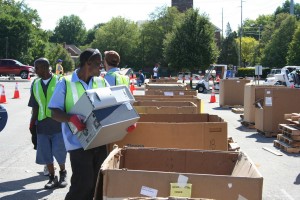
RecycleForce employees carry out recycling project at Butler University in Indianapolis.
While businesses created to hire ex-offenders remain few and far between, Gregg Keesling of Indianapolis is proving that they’re not only possible but profitable as well.
His nonprofit RecycleForce has found success in not only providing innovative recycling services throughout Indiana but in recycling the lives of ex-offenders into productive employees.
It all had a rather serendipitous start. Keesling was living in Jamaica, running a resort in the town of Negril with his Jamaican wife, when the Rotary Club of Indianapolis came to visit and convinced them to return to the states. The Keeslings settled in Indianapolis and established Keys to Work, a workforce development program based on public/private partnerships.
His wife Jannett Keesling still runs Keys to Work, but after seeing many of their Keys to Work employees being locked up, Gregg decided to concentrate on helping ex-offenders become employed. He planned to hire ex-offenders to manufacture filters and took over the old RCA building in Indianapolis to do it. The filter business never materialized, but another opportunity did. “The landlord came and said, ‘We’ve got this computer equipment in the basement. Can you do something with it?” Keesler says.
In 2006 he launched WorkForce Inc., now RecycleForce, to do something with that computer equipment. In a few short years, the business has grown from two workers processing 600,000 pounds of materials to more than 35 employees processing 3.4 million pounds of processed recyclables each year. Or at least those were the numbers until late last year.
RecycleForce awarded $5.5 million grant
Things at RecycleForce have changed a bit since then. In July 2011, RecycleForce and its partners received a $5.5 million grant from the U.S. Department of Labor to help ex-offenders in Marion County, an area that includes Indianapolis and some of its surrounding suburbs.
RecycleForce is one of seven organizations selected from 80 applicants nationwide to be a part of the Enhanced Transitional Jobs Demonstration program, created to study the effect that having a job and case management services has on the employment success of ex-offenders.
The program works like this. The Marion Superior Court Probation Department referred 1,000 ex-offenders to the ETJD program. Five hundred of these are randomly assigned to the program and given a four-month transitional work assignment. The other 500 randomly assigned ex-offenders are part of a control group that will receive services as usual in the community. The grant covers a four-year period, with three months for the initial implementation, two years of actual participant enrollment and another year for follow-up. The study is being conducted by MDRC, a social policy research organization with offices in New York City and Oakland, Calif.
“Participants have been out of prison for 120 days or less, they’re high risk, and they’ve never had a job for more than a year in their life,” Keesling says.
His new workforce, although greatly enlarged thanks to the grant, is less stable than the previous one. “While a total of 198 people have been assigned to me, only 105 are working for us every day, 25 have gone on and gotten a job on the outside, eight are back in prison and 54 are floaters, who may show up, but we’re not sure where they are on any given day,” he says.
In addition to providing four months of employment, RecycleForce helps ensure that participants stick with the program. “The most important thing we do is become their parole violation advocate when they have a technical rule violation,” he says. “We go to court and convince the judge that they shouldn’t go back to prison. We’re giving the court system an alternative.”
Core business remains the same
Although the employee count and the finances have changed, RecycleForce’s business remains the same. It specializes in recycling electronic waste and also handles cardboard, plastic, aluminum and paper.
It operates recycling events throughout the region, has contracts with the city of Indianapolis and state of Indiana for end-of-life materials, does strip outs for corporations, and partners with colleges throughout the state to do recycling. The nonprofit maintains collection sites in Terre Haute, Ossian and Richmond and plans a full-scale operation in Columbus, Ohio.
Giving ex-offenders a chance
Not just a successful business, RecycleForce has succeeded in helping ex-offenders turn their lives around. The recidivism rate of those who have gone through the program is 25 percent, half the average rate for the region.
When given a true opportunity they will take greater advantage of it than someone without the barrier,” says Keesler. “The best workers are the ones who committed the most serious crimes. They’re generally older, and they truly want to repair their past. We’re successful 70 percent of the time with that population.”
“We’re only successful 20 or 30 percent of the time with younger people. The young guys don’t want to work. ‘My mamma work, I don’t have to work,’ they say. They spend too much time in the bathroom texting their women. The provider role for low-income men is disappearing,” he says.
One of Keesling’s challenges is helping to reverse that trend, and he doesn’t seem to be ready to give up on these young men – or any ex-offenders for that matter – anytime soon.
To learn more about RecycleForce, checkout www.recycleforce.org


I am writing my dissertation on companies who hire ex-offenders and how this reducing reoffending for my Criminology degree.
Is there a recycleforce in Wales or the UK. I would love to chat to some employers and employees about this for my dissertation!
Or know of anyone who could help in other companies in the UK.